In 1825, Ilarion, the Greek Metropolitan of Trnovo, made a bonfire of the old library of the Bulgarian Patriarchate, which till then had survived all the vicissitudes of the Turkish era. It is perhaps only fair to add that these habits of destruction and the kindred practice of forging historical documents or monuments have been adopted by every race in the peninsula at one time or another. Only the Turks were either too lazy or too contemptuous to indulge in such competition.
Exposing Bulgarian Myths and Lies
Collapse
X
-
Onur that is something I would like to look into more. The historian R.W. Seton-Watson has stated that a very common thing in the 19th century Balkans was the destruction of documents and artifacts and the forging of the same all in the name of creating a history.
The rise of nationality in the Balkans, R.W. Seton-Watson page 81Last edited by TrueMacedonian; 09-21-2010, 06:14 PM.
-
-
Originally posted by TrueMacedonian View PostI guess the Bulgarians have to thank the Russians for a country and the Germans for erroneous terminologies.
I read in several sources that after 1878, when Russians took control of Bulgaria, they literally changed everything in Bulgaria, including their language, education system and even their historical concept. I even heard that their history and archival documents has been rewritten.
Anyone knows any article or a document of what kind of things changes occurred in Bulgaria after they "liberated"!?
Leave a comment:
-
-
Ever wondered when the term "Old Church Bulgarian" was invented? Ever wondered who invented such a term? Here's the German inventors of "Old Church Bulgarian";
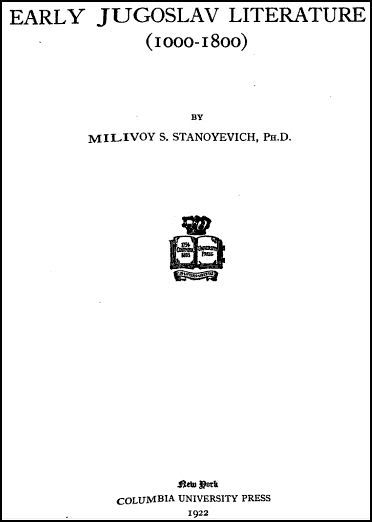
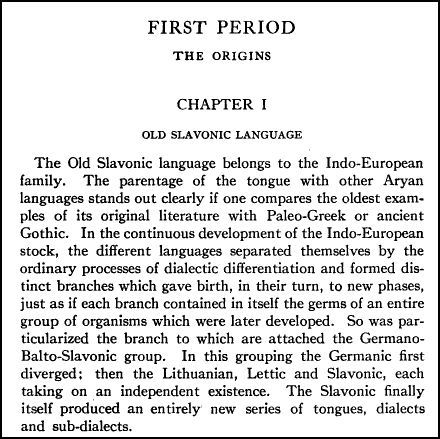
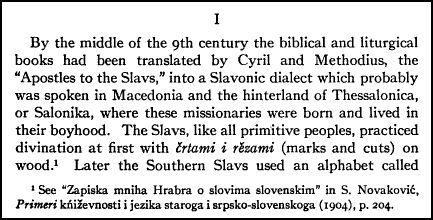
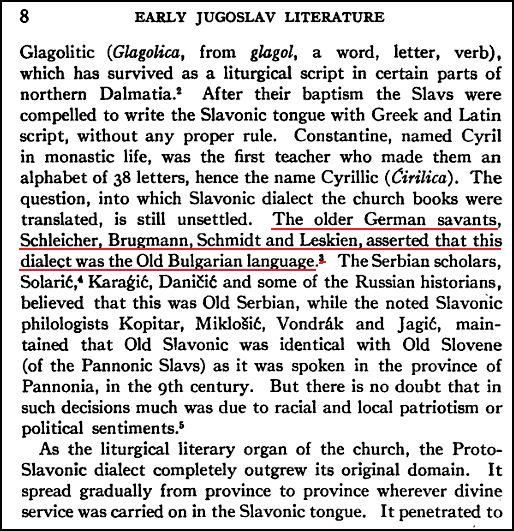
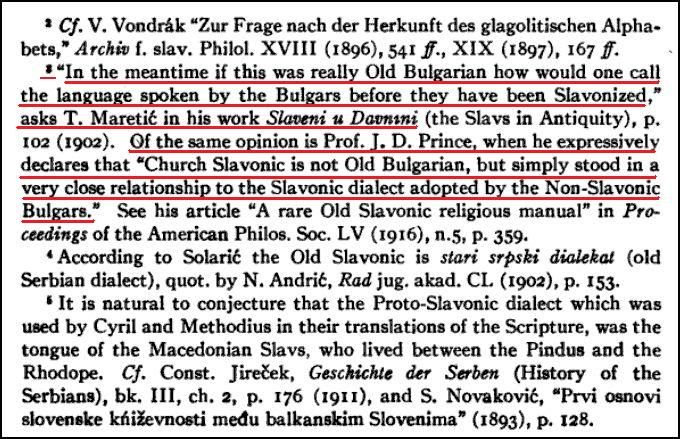
I guess the Bulgarians have to thank the Russians for a country and the Germans for erroneous terminologies.
Leave a comment:
-
-
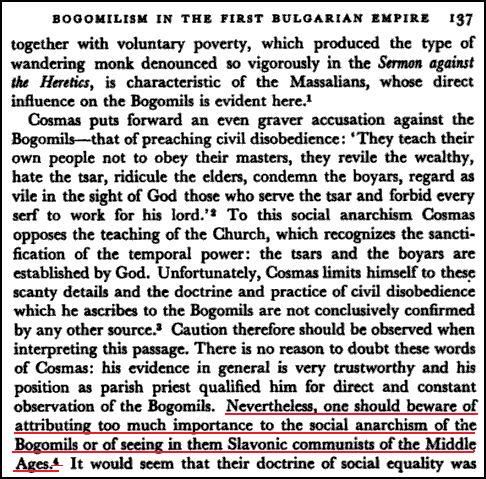
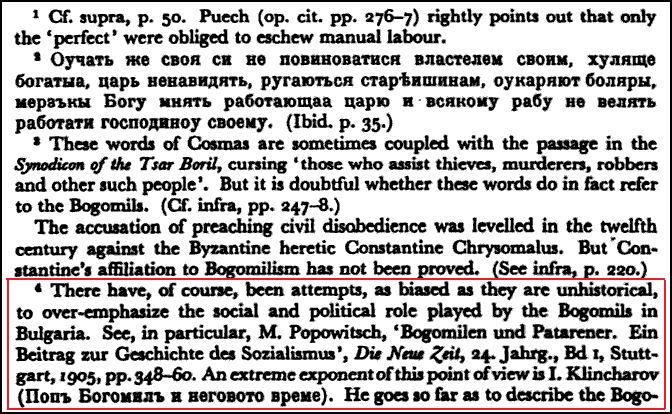
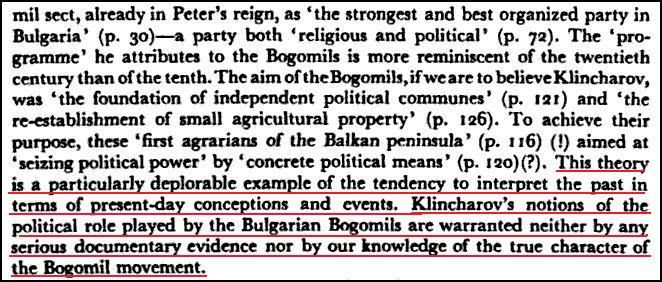
The Bogomils by Dmitry Obolensky
How funny is this. Bulgarian "scholars" finding communists in medieval times lol.
Leave a comment:
-
-
How very true.Originally posted by El Bre View PostThe answer to your question is actually quite simple. The power brokers of the time had no interest in creating a free and independent Macedonia and devoted a great deal of effort to make sure that it didn't happen.
The Macedonian cause had no "big brother" which is something that the others in the area benefitted from greatly. We had no patron state to supply arms and training and therefore, any form of uprising was doomed from the start. As a result we were forced to hitch our wagons to one of the three competing factions. This was the beginning of the deep divisions in the Macedonian population which continue to plague our community and dilute our numbers.
Leave a comment:
-
-
That's agood point el bre.In regards to onur's question i know for a fact that the british seeing the role that they played in the balkan wars allowing macedonia to be partiotioned etc.Apparently there are documents embargoed in the british archives??I don't know how to access that & there is a wealth of information what the brits have written about the macedonians.
Leave a comment:
-
-
The answer to your question is actually quite simple. The power brokers of the time had no interest in creating a free and independent Macedonia and devoted a great deal of effort to make sure that it didn't happen."Greeks with the help of Brits and Bulgars-Serbs with the help of Russians desires to occupy Macedonia and erase it from the map by sharing it`s territories among themselves".
While everything was so obvious for Turkish authorities and community since 1895s, how come Macedonians couldn't realize this? I mean, if they would already accepted partition of Macedonia, then why there are articles like that in 1913? Probably you guys read a lot of documents from that era and you can comment on this.
The Macedonian cause had no "big brother" which is something that the others in the area benefitted from greatly. We had no patron state to supply arms and training and therefore, any form of uprising was doomed from the start. As a result we were forced to hitch our wagons to one of the three competing factions. This was the beginning of the deep divisions in the Macedonian population which continue to plague our community and dilute our numbers.Last edited by El Bre; 09-17-2010, 06:41 PM.
Leave a comment:
-
-
Originally posted by Makedonetz View PostWhat did Bulgaria represent for Macedonia, 1913!
September 5, 1913
......
Is not Bulgaria to be blamed for the partition of Macedonia, hiding the real aim of the war from the representatives of the Macedonian people, which it had to reckon with. On the contrary, starting the war, it declared to the Macedonians that it was fighting against Turkey alongside the allies for their liberation. Allowing the Macedonians to organize themselves into military units, Bulgaria committed a hunderdfold crime, because it did not allow them to fight against Turkey in their native land, but directed them to Thrace, towards the shore of the Sea of Marmara, under the walls of Adrianople and the trenches of Chataldzha, which weren’t needed, except for a bunch of Bulgarian glory-hunters; and the happened at the same time when the allied Bulgarians, Serbs and Greeks were conquering Macedonia. How can we explain this criminal act of the Bulgarians towards the Macedonians, if not by the fear that those same Macedonians with arms in their hands would defend their homeland equally from any encroachments upon its independence?
.........
Taken from Dimitrija Chupovski, Makednoskii Golos, pages 130-133
I cant understand one thing about Macedonian frustration for Balkan war. Especially after ~1895, i saw 10s of newspaper articles, government archive reports about Bulgar and Greek aims for Macedonia. All the Turkish articles from that era basically says same sentence;
"Greeks with the help of Brits and Bulgars-Serbs with the help of Russians desires to occupy Macedonia and erase it from the map by sharing it`s territories among themselves".
While everything was so obvious for Turkish authorities and community since 1895s, how come Macedonians couldn't realize this? I mean, if they would already accepted partition of Macedonia, then why there are articles like that in 1913? Probably you guys read a lot of documents from that era and you can comment on this.
Btw, i didn't know that Bulgars from Sofia organized Macedonian troops and sent them to Edirne/Adrianople. Then this means, Bulgars used and abused Macedonians like the British did to Australians by sending them to Canakkale/Gallipoli to fight vs Turks at 1915. In the Balkan war, Turkish troops pretty much only fought at eastern Thrace, Edirne. Russians ordered Bulgars to proceed towards eastern Thrace right at the beginning of Balkan wars, hoping they could reach Istanbul with this way. This was their only aim cuz eastern Thrace was never a place populated by Bulgars. I think there was only 100-150 pomaks in there who speaks Bulgarian, that was all. Because of that imminent threat, Ottoman government feared that Istanbul`s security could be in danger and they immediately called all the Turkish troops in Macedonia to retreat back to eastern Thrace. So, all the Aegean Macedonia and current ROM has been abandoned by Turkish troops without involving any fight. Turks only fought in eastern Thrace to throw Bulgarian army out of there.Last edited by Onur; 09-17-2010, 04:57 PM.
Leave a comment:
-
-
Here is something I hope we can add on to Bratot;Originally posted by Bratot View PostMyth N' 2.
Bulgarians claim that the state of Tsar Samoil was continuance of the Bulgarian, but that's clearly not the case:
"In 972 the emperor Joan Tsimishi destroyed the political and ecclesiastical independence of the Eastern Bulgarian kingdom."
Source: Църковен Вестник, Издание на Българската Православна Църква, Година 103, брой 9 и 10, София, 1-30 май 2003, наслов “Българските патриарси през Средновековието” Александра КАРАМИХАЛЕВА).
After what the Bulgarian Kingdom ceased to exist and the Bulgarian crown was taken to Constantinopol.
Because of these 2 points, the end of the kingdom and the captured crown, it's more than obvious Samoil couldn't be the successor of the Bulgarians.


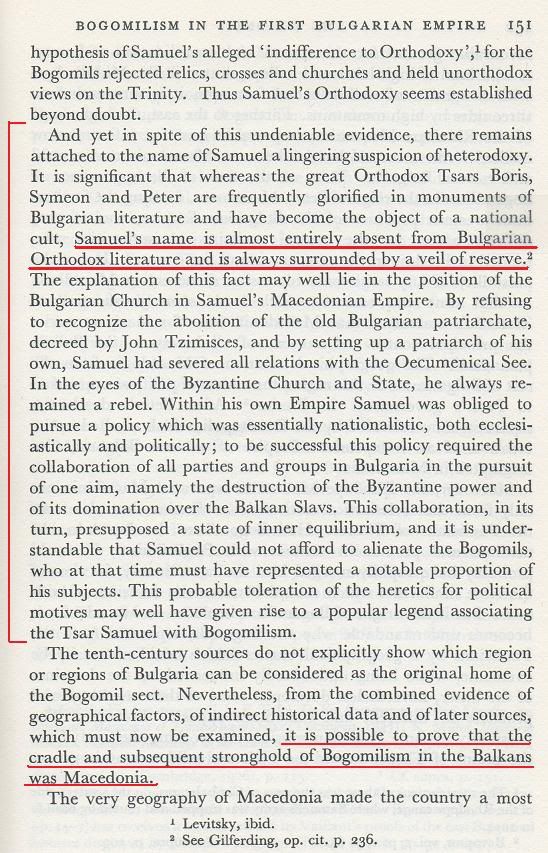
Leave a comment:
-
-
Nice research Bratot and Makedonetz. The arguement for Tsar Samoil being a Bulgar is a politicized modern arguement. Speaking of political;
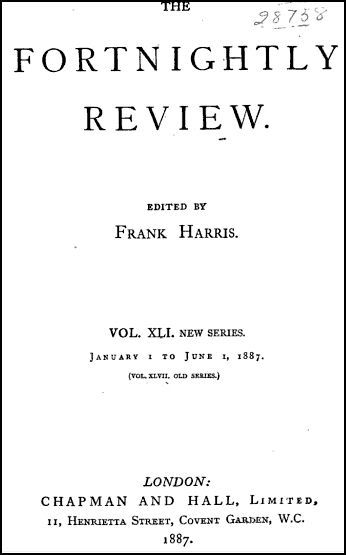

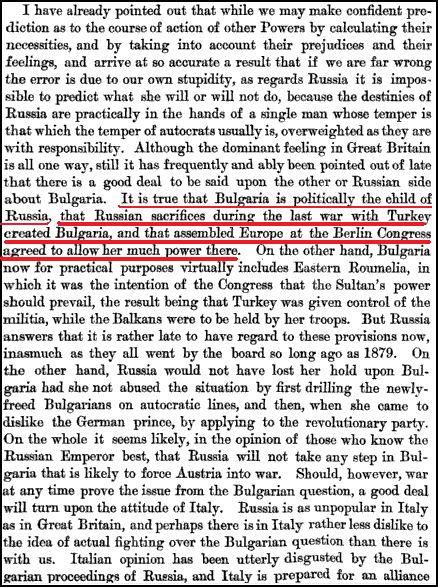
Leave a comment:
-
-
What did Bulgaria represent for Macedonia, 1913!
September 5, 1913
Dimitrija Chupovski: What did Bulgaria represent for Macedonia
The Bucharest Conference of the Balkan states completely destroyed Article 23 of the Berlin Congress which stipulated the introduction of reforms in Macedonia as a self-governing province of Turkey. At the time this stipulation gave wings to the hopes of the Macedonians for the possibility of creating an autonomous Macedonia and proved to be a counter-balance to the stipulations of the Treaty of San Stefano, which defaced Macedonia by its inclusion within the boundaries of Greater Bulgaria. However, regardless of the stipulations of the Berlin Congress, the Treaty of San Stefano constantly instigated the Bulgarians to actions for creating a Greater Bulgaria at the expanse of Macedonia and they continually spent millions of rubles for agitation in Macedonia by opening their own, purely Bulgarian, schools and churches. As a result of this, Bulgaria began regarding itself as the only future liberator of Macedonia, comparing its role in the cause of the liberation of Macedonia with the role of Russia in the liberating Russo-Turkish War. We, however, cannot agree at all with such a comparison….Russia was Bulgaria’s liberator, and accordingly, to compare its role with the role of Bulgaria in the present war is, at the very least, absurd and ridiculous for our contemporaries, before whose eyes this tragicomedy was being acted. The role of Bulgaria as regards to Macedonia was from the very beginning criminal; it was first to violate…the article of the Berlin Treaty which bound Turkey to introduce reforms in Macedonia. Moreover, carrying out unbearable, extremely chauvinist, propaganda among the Macedonians through its Constantinople Patriarchate, Bulgaria was the first to cause rivalry and the introduction of similar propaganda by the Greeks and the Serbs, thus instilling discord among the Macedonians. During the whole 30 years of its existence as a state, Bulgaria has carried out anti-Macedonian policy. Flattering and attracting the Macedonians to its side. at the same time it persecuted them with ferocity and hatred and strove to destroy in them any idea of an autonomous Macedonia; while doing so, the Bulgarians did not shrink from using any means. Thus, in 1888, the Bulgarian Government destroyed the ‘Macedonian Literary Society’ under the presidency of Georgi Pulevski….Two years later, in that same Sofia, the Bulgarian Government closed the evening schools, specially opened for the emigrant Macedonian craftsman, and the heads of those schools. Macedonian patriots – Damjan Gruev, Delchev, Petre Pop Arsov and many others – were expelled from Bulgaria. In addition, let us consider just those persecution to which the so-called Internal Macedonian Organization was exposed, working on the spiritual revival of Macedonia and its political liberation. Its members were persecuted both by the Bulgarian government and the Exarchate, the local instrument of those governments. In order to paralyze the successes resulting from the activity of the Internal Macedonian Organization, the Bulgarian government formed with Macedonian emigrant a requisite counter-Macedonian organization (made of the dregs(?) of society), known under the name of the Supreme Macedonian-Adrianople Committee, the task of which was to trumpet to the whole world that Macedonia is a purely Bulgarian country. Who does not know the shameful role of this Committee shown through its activity on the partition of Macedonia as a whole and of the Macedonian intelligentsia in particular? Guided by the Bulgarian government through its teachers and generals of the type of Mihajlovski and Conchev, this Committee acted against the Macedonian liberation movement and worked with all means on the annexation of Macedonia to Bulgaria. Still more criminal was the role of Bulgaria in this shameful ‘liberation’ war. Did not Bulgaria hold long negotiations concerning the division of Macedonia with its present occupiers? Did it not, according to the treaty of 29th February 1912 with the Serbs, give to them the whole western section of Macedonia and thus violate its integrity? Did not Bulgaria, which attracted Greece, too, to the Serbo-Bulgarian alliance, start to divide Macedonia? Could it not know that the Greeks might join the alliance only because they had in mind the acquisition of the southern section of Macedonia? Is not Bulgaria to be blamed for the partition of Macedonia, hiding the real aim of the war from the representatives of the Macedonian people, which it had to reckon with. On the contrary, starting the war, it declared to the Macedonians that it was fighting against Turkey alongside the allies for their liberation. Allowing the Macedonians to organize themselves into military units, Bulgaria committed a hunderdfold crime, because it did not allow them to fight against Turkey in their native land, but directed them to Thrace, towards the shore of the Sea of Marmara, under the walls of Adrianople and the trenches of Chataldzha, which weren’t needed, except for a bunch of Bulgarian glory-hunters; and the happened at the same time when the allied Bulgarians, Serbs and Greeks were conquering Macedonia. How can we explain this criminal act of the Bulgarians towards the Macedonians, if not by the fear that those same Macedonians with arms in their hands would defend their homeland equally from any encroachments upon its independence? But in fact Bulgaria thus ruined not only Macedonia but also all its future. Shedding now crocodile tears for the lost Macedonia, did Bulgaria at the proper time make any attempt to preserve the indivisibility of Macedonia, which it likes to call its younger sister? How can some Bulgarian patriots claim that Bulgaria was in respect to Macedonia that biblical mother which appeared before Solomon’s court? Would not a mother worthy of setting an example rather prefer to renounce her own son in only he could thus remain intact? However, as we all know, Bulgaria was the first to agree to the partition of Macedonia. Why has not Bulgaria up to this moment acted like a real “native mother” with her unselfishness, with motherly generosity towards Macedonia, with a project for its autonomy? This is exactly the attitude of Bulgaria which could have ensured the integrity and indivisibility of Macedonia, peace among the Balkan peoples and would have preserved the dignity of the “native mother” herself – Bulgaria. What hindered it, having included the item about the autonomy of Macedonia in the treaty, from raising at the proper time the question about the realization of that item? Nobody hinder it at all, but it did not make any attempts itself to raise this question. It did not make this attempt after the end of the first half of the war, when it realized that its allies of yesterday, the Serbs and the Greeks, having occupied Macedonia, would not like to leave it. And instead of submitting a project for autonomy, it decided to go to war, in order to gain as great as possible a section of Macedonia for itself. Even following the defeat, when the question was posed not for Macedonia but for Bulgaria itself – I am referring here to the Conference of Bucharest, where Bulgaria was “generously” offered an eighth or tenth part of Macedonia – here, too, it preferred to take that part, and did not follow the example of the biblical mother, renouncing its share of the child. I repeat, the following of this, there are some people again who compare the present position of Bulgaria to the position of Russia in the liberating Russo-Turksih War, with a desire in this way to represent it in the role of the same unselfish liberator as Russia was with regard to Bulgaria itself, refusing to see that the main reason for the misfortunes of Macedonia were precisely the Bulgaria aspiration towards this long tortured land.
Taken from Dimitrija Chupovski, Makednoskii Golos, pages 130-133
Leave a comment:
-
-
The biggest historical paradox in the Bulgarian historiography is the next:
Roman was the king of Bulgaria (977-997).
Samuel's empire existed from 976 until 1018.
Now, whether is it possible that Bulgarians at the same time had two Emperors?
Roman 977 -997
Samuel 976 - 1018
So 21 years Bulgarians have been a kingdom with two Emperors.
Leave a comment:
-
-
Myth N' 4.
In addition they often use the Byzantine author John Scylitzes, with this text to depict Samoil and his people as "Bulgarians":
The emperor [Basil] did not relent, but every year he marched into Bulgaria and laid waste and ravaged all before him. [The Bulgarian ruler] Samuel was not able to resist openly, nor to face the emperor in open warfare, so, weakened from all sides, he came down from his lofty lair to fortify the entrance to Bulgaria with ditches and fences. Knowing that the emperor always made his incursions through so-called “Kiava Longon” 1 and [the pass known as] “Kleidion,” he undertook to fortify the difficult terrain to deny the emperor access. A very wide fence ( phragmon ) was built and worthy defenders were committed to it to stand against the emperor. When he arrived and made an attempt to enter [Bulgaria], the guards defended the wall manfully and bombarded and wounded the attackers from above. When the emperor had thus despaired of gaining passage, Nikephoros Xiphias, the strategos of Philippopolis, met with the emperor and urged him to stay put and continue to assault the wall, while, as he explained, he turned back with his men and, heading round to the south of Kleidion through rough and trackless country, crossed the very high mountain known as Belasica. On 29 July, in the twelfth indiction [1014, Xiphias and his men] descended suddenly on the Bulgarians, from behind and screaming battle cries. Panic stricken by the sudden assault [the Bulgarians] turned to flee, while the emperor broke through the abandoned wall. Many [Bulgarians] fell and many more were captured; Samuel barely escaped from danger with the aid of his son, who fought nobly against his attackers, placed him on a horse, and made for the fortress known as Prilep. The emperor blinded the Bulgarian captives -- around 15,000 they say -- and he ordered every hundred to be led back to Samuel by a one-eyed man. And when [Samuel] saw the equal and ordered detachments returning he could not bear it manfully nor with courage, but was himself struck blind and fell in a faint to the ground. His companions revived him for a short time with water and smelling salts, and somewhat recovered he asked for a sip of cold water. Taking a gulp he had a heart attack and died two days later on 6 October
But what they forgot to mention is that:
1. Skylitzes was born in the beginning of 1040's.
2. The Theme Bulgaria on the territory of Macedonia, Serbia, Albania, Bulgaria already existed since 1018.
3. Skylitzes was writing most probably between 1079 and 1096, thus already up to eighty years after the battle.
He lived in changed reality, the existance of the different administrative territorial name and in respect of this fact he was reffering to the history.
4. Skylitzes did not called Basil as "Vulgaroktonos"!
5. Skylitzes says quite clearly that Skopje is the capital of Bulgaria, and the people of Bulgaria Bulgarians (for uprising of Czar Peter DELJAN in "Chronicle" from Skylitzes).
But Skopje was the capital of BULGARIA THEME, not the state of Bulgaria and John himself tells that under Bulgarian means citizens of Bulgaria theme!
If the state of Samuil was really called and was Bulgaria, then Skylitzes would speak of Ohrid as the capital of Bulgaria.Last edited by Bratot; 09-17-2010, 02:58 AM.
Leave a comment:
-
-
Myth N' 3.
Bulgarians often try to claim that Vasil II " the Bulgarslayer" has earned his nickname because he defeated exactly the "Bulgarians" of Samoil, as a prof.
If we pay attention when did he got this name we will come to this:
In chapter five, Stephenson explores how the contemporary authors referred to Basil. An extensive survey of the Byzantine sources reveal that instead of Voulgaroktonos, Basil was generally referred to as porphyrogennetos or "born in the purple" to show he was the reigning emperor.Otherwise he was referred to as "the younger" or "the second". Thus Basil was known to the chroniclers and others as Basil II. This trend continued in the literature well beyond the life of Basil. Stephenson also reveals that this was well known even to biographers in the seventeenth century.
It is not until chapter six thatthe mystery is revealed in why Basil transforms from porphyrogennetos into the Voulgaroktonos. As one might suspectit has more to do with political changes, particularly in the ways that Bulgars were viewed in the twelfth century, rather than any particular historical activities. However, Basil image would decline again in later centuries, particularly with the rise of the Turks and a decline in the threat from the Bulgars.
The Legend of Basil the Bulgar-Slayer
The nickname "Vulgaroktonous" is first mentioned in 14th century in the Ephraim Aenii Historia Chronica.
Leave a comment:
-
-
Myth N' 2.
Bulgarians claim that the state of Tsar Samoil was continuance of the Bulgarian, but that's clearly not the case:
"In 972 the emperor Joan Tsimishi destroyed the political and ecclesiastical independence of the Eastern Bulgarian kingdom."
Source: Църковен Вестник, Издание на Българската Православна Църква, Година 103, брой 9 и 10, София, 1-30 май 2003, наслов “Българските патриарси през Средновековието” Александра КАРАМИХАЛЕВА).Original: През 972 г. император Йоан Цимисхи унищожава политическата и църковна независимост на Източното българско царство.
After what the Bulgarian Kingdom ceased to exist and the Bulgarian crown was taken to Constantinopol.
Because of these 2 points, the end of the kingdom and the captured crown, it's more than obvious Samoil couldn't be the successor of the Bulgarians.
Leave a comment:
-


Leave a comment: